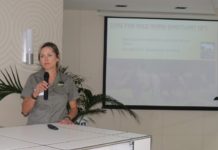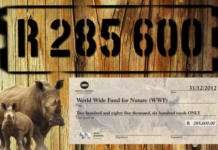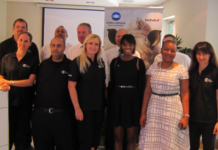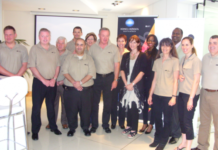Konica Minolta South Africa handed over its second quarter cheque, worth R313 700, on 8 February to the World Wildlife Fund (WWF) South Africa in support of its rhino conservation programme.
Last year, a record 450 rhinos were poached in South Africa. Twenty eight have already been poached this year. To assist efforts and interventions which help to preserve the rhino population, KMSA donates R100 for every bizhub multifunctional device sold to WWWF-SAs rhino conservation work.
Speakers at the event, which took place at the KMSA head office, included Dr Joseph Okori, head of WWFs African Rhino Programme, as well as Dr Andrew Baxter, Executive Head of Business Development at WWF-SA and Dr Cindy Harper, Director of the Ondersterpoort Veterinary Genetics Laboratory at the University of Pretoria. Visitors from Kenya, including Dr Shadrack M. Muya, lecturer at the Jomo Kenyatta University of Agriculture and Linus Kariuki from the Rhino Programme and Moses Otiende, a molecular biologist, from the Kenya Wildlife Service, also attended the event.
WWF appreciates KMSAs support of our rhino conservation efforts. Strategic engagement and demonstrable commitment by government, business and the public to tackle the poaching challenge has become a necessity for rhino conservation, said Dr Okori. He said that the WWF-KMSA partnership would help the organisation to strengthen its law enforcement efforts through support for its DNA database process. With KMSAs funding, 300 DNA forensic tests have been supplied to the Kenya Wildlife Service. Initial forensic sample training in Kenya, which has the words largest population of black rhino, has also been funded through the partnership. Dr Okori said that the region was a pioneer for other African countries in rhino conservation.
The funds have also helped WWF to pay for emergency veterinary treatments for injured rhinos, improved monitoring of rhino populations and increasing rhino range so that new populations can breed.
Dr Harper explained the aims of RhODIS (Rhino DNA Index System), a rhino DNA database. The DNA profiles are obtained directly from the rhino horn. The database has profiles from rhino from national and provincial parks and private owners in South Africa; DNA profiles from all poaching cases; profiles from recovered horns and stockpile horns and profiles from rhinos from Zimbabwe, Botswana, Namibia. The database currently consists of 3000 rhino. These DNA profiles serve as a traceability tool and horn identification method, so the profiling is a forensic tool to assist rhino poaching investigations. Profiles can be used as evidence in poaching cases, as the horn which has been seized or recovered can be traced back to the rhino which was poached, linking the poachers to the rhino.
At KMSA, employees have really bought into the initiative and the company is committed to this fight against a gross injustice.

















